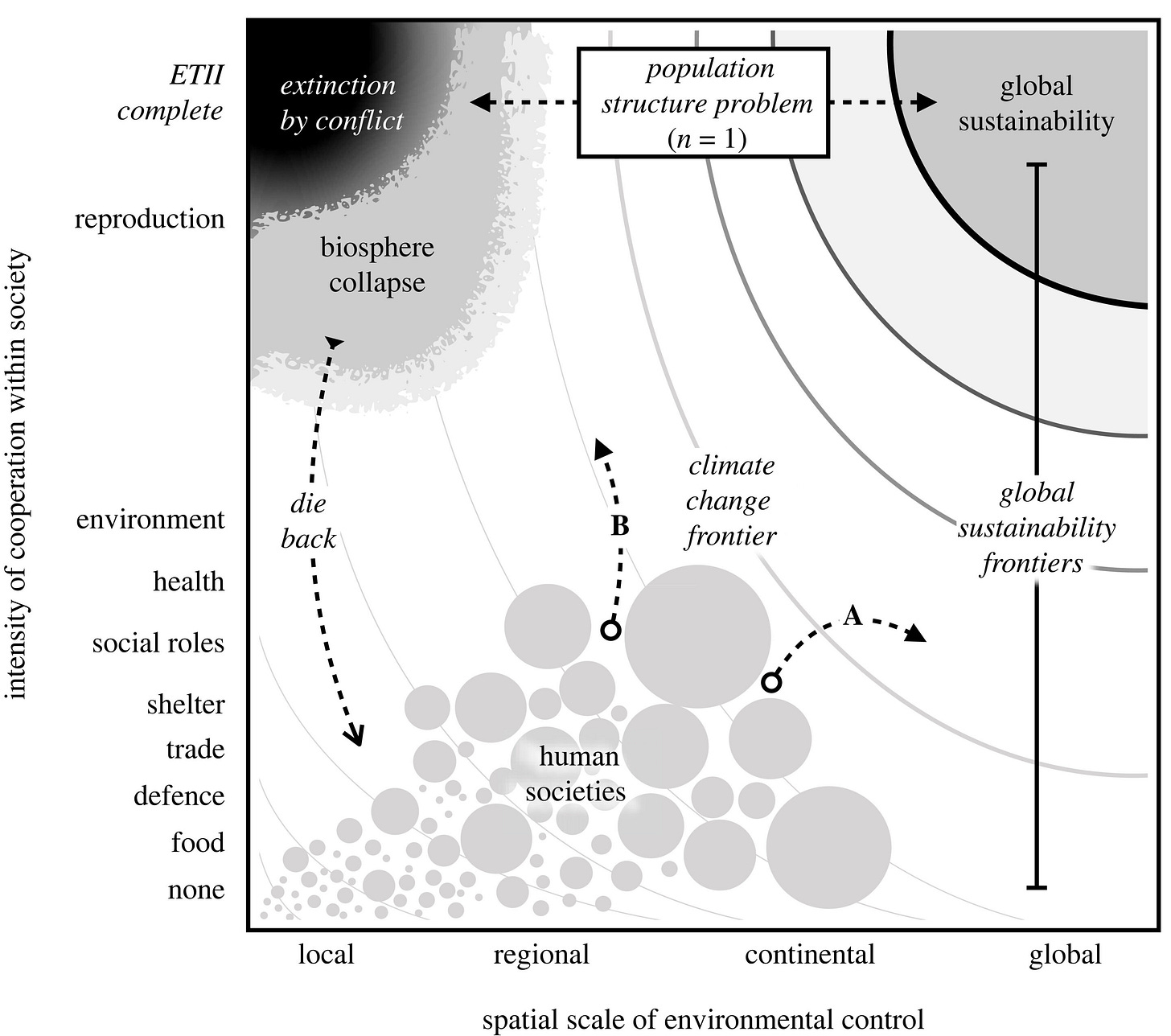Evolution might stop humans from solving climate change, researchers say
The only solution? We must evolve!
Even evolutionary biologists and scientists studying global sustainability begin to question whether our species, the homo sapiens, is capable at least in principle of coping with climate change. Characteristic processes of human evolution caused the Anthropocene and may obstruct its global solutions (for a summary see also here.)
From the evolutionary standpoint, our survival instincts always relied on environmental exploitation, unlimited reproduction and expansion, domination, conquest, competition, and the preservation of our selfish interests. If we opted for cooperation and compromised our interests with those of a larger group, it was only to maintain the social cohesion of the family, group, pack, tribe, or nation, never that of the species at a global and collective scale. The ideal of human unity necessary to overcome the challenges posed by climate change, global overshoot, and overpopulation is something new in evolutionary history, not only for humankind but for life on Earth. An ideal that cooperates towards a common goal, transcending group competition and an exclusively local or national fellowship, subordinating it to a larger human family, strongly contradicts our innate biological instincts. The same evolutionary drive that made our species successful is now turning against us.
We can take two routes—that of acting now and creating a globally sustainable society, or that of inaction which will, sooner or later, inevitably lead to the biosphere collapse. Unfortunately, so far, we are heading for the latter path.
The article is interesting because for the first time, as far as I’m aware, scientists think in terms of solutions to global problems like climate change and overpopulation in terms of the necessity to make an evolutionary transition.
Tackling the climate crisis effectively will probably require new worldwide regulatory, economic and social systems—ones that generate greater cooperation and authority than existing systems like the Paris Agreement. To establish and operate those systems, humans need a functional social system for the planet, which we don't have.
We don't have any solutions for this idea of a long-term evolutionary trap, as we barely understand the problem.
Or, in other words, if we want to avoid this ‘evolutionary trap’ and be able to build a global collective action and governance, we must evolve from a selfish, materialistic, and consumerist society towards a post-material species. It is the kind of evolution (and solution) I was writing about here and that, after all, is one of the main motivations of this newsletter. Perhaps, the planetary problems we have to deal with nowadays may not be a random coincidence that took Nature by surprise but, to the contrary, may have a purpose and an aim helping us to transcend ourselves and become a better species.





This is exactly right.
Do you still feel like any significant evolution will not take place within the next 50 years?
I'm assuming you, though almost definitely not me, may live at least 40 more years, and you seem to be among the wisest I know of writing about the possible evolution needed.
I'd love to see you write more on what it would take to hasten the evolution in the next 50 years. And I'm not, of course, talking about the planetary acknowledgement of the supramental. Just a simple post materialistic science might be a good start. I certainly seems to me, if I look at the reaction 28 years ago to Chalmers' declaration of the hard problem, and the exponential increase in just the past 5 years of scientists willing to even talk about the possibility of consciousness as fundamental, that something is speeding up exponentially in the world of the greatest living scientists.
And I still see immense possibilities in the fact that Dan Siegel went from a basically materialistic view of the mind in around 2003, to seeing the connection between his ideas of "mindsight" and conventional mindfulness, to writing the book "Aware" in 2018 which is basically a post materialistic view of consciousness (the book was partly inspired by French physicist and philosopher Michel Bitbol, who has written a beautiful and brilliant essay available for free online, "Is Consciousness Primary?" (Spoiler alert - he answers in the affirmative).
But even more so, the fact that well over 100,000 children around the planet are practicing Dan's "Wheel of Awareness" in their classrooms - an exercise which is remarkably close to Advaita and Dzogchen and Chan and Zen practices for realizing the Self.
Something may be happening we can't see on the surface.